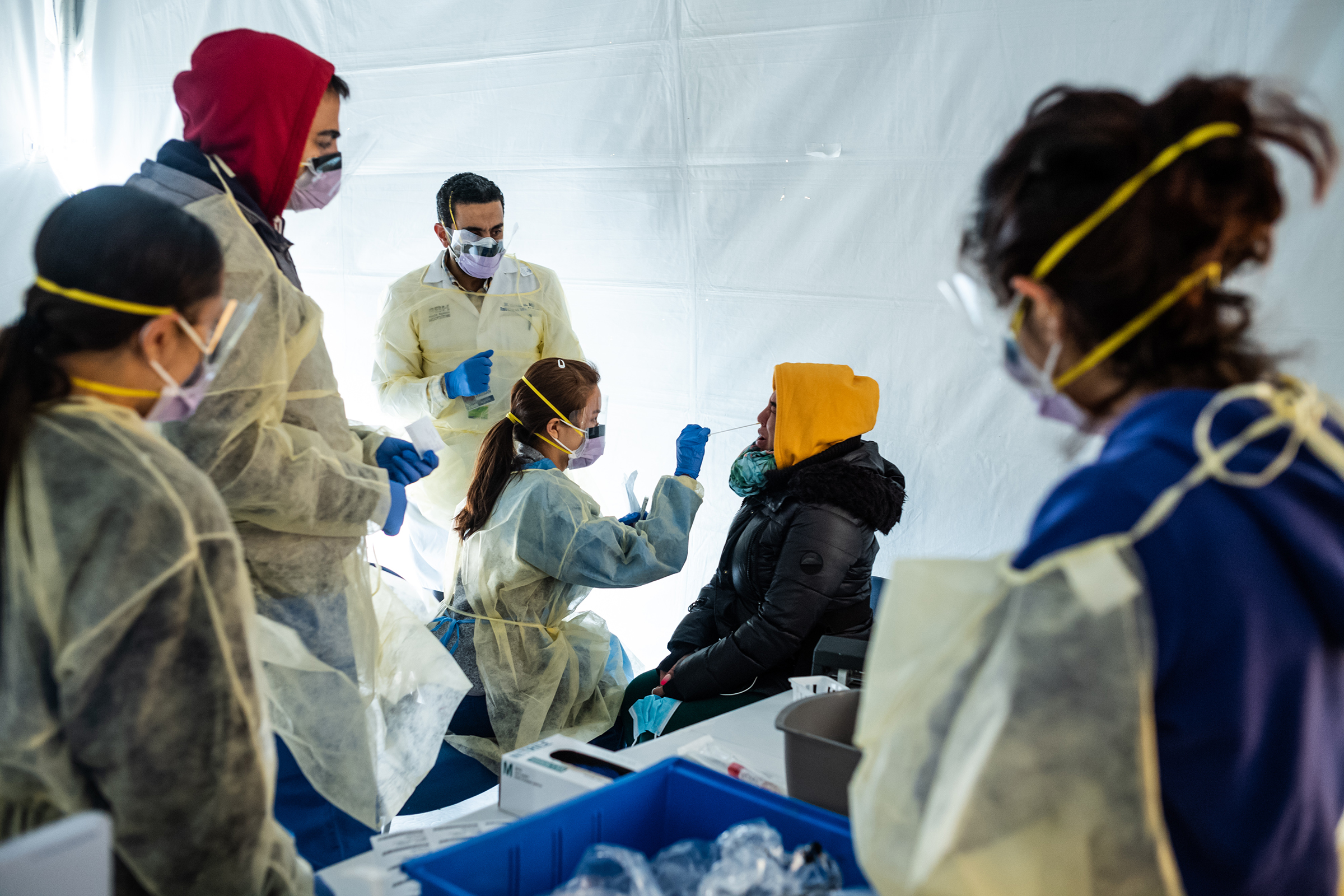
I never imagined needing to have end-of-life conversations with my wife while we were in our thirties. But here was my wife, a doctor board-certified in internal medicine, giving me directives a few days ago as she suited up to head to her New York hospital amid the coronavirus pandemic.
“If I’m on a ventilator, I don’t want you to come visit me,” she said stoically. “And do everything you can to keep my parents away, too. I don’t want to infect any of you.”
That was the moment it hit me.
I was getting a glimpse into what it might feel like for a spouse right before a loved one in the military deploys for active combat.
My GI Jane is an empathic and wicked smart physician (she’s from Boston), who was voted by her peers as the one they would want to take care of their own families if they were in the hospital. Like other doctors, she took an oath to take care of her patients—including and perhaps especially during crises like COVID-19. While my wife has the skill to save countless lives, I’m newly worried about her own.
As the metaphorical equivalent of an army husband, I’m dutifully staying at home, doing my part, anxious about the battlefield she is entering. I have a plea: Just like you wouldn’t send an American solider into battle without the proper armor, please don’t keep sending my wife into battle without proper protective equipment.
With over 46,000 confirmed COVID-19 cases in the U.S., there is a frightening shortage of personal protective equipment (PPE). Whether it’s N95 masks or face shields, the supply is dwindling quickly and precipitously. Doctors are being forced to take extraordinary measures, including reusing facemasks repeatedly. When my wife worked last week, hospitals had already begun rationing, giving her a single surgical mask (which does not protect effectively against coronavirus) to use for a day of patient visits.
As more patients test positive, the likelihood of COVID exposure rises for all healthcare workers, and the risk of potential infection rises more for those regularly involved in aerosolizing procedures, like intubation and endoscopy, which my wife regularly performs. This is utterly unsafe without protection, not only for my wife and colleagues, but also for the nurses, anesthesiologists, and janitorial staff cleaning rooms between cases. By extension, their families and anyone else they encounter are also at risk.
It doesn’t take a fortune-teller to know what is coming. I look to Italy today and shudder, seeing doctors already dead from exposure to coronavirus due to a lack of protective equipment. Will we wait for US doctors to meet the same fate before taking substantive action?
Unfortunately, the federal government, which has known since January that a pandemic was coming, has been very slow in its public response and in mobilizing to address the crisis. Our commander in chief is passing the buck, telling states to procure their own ventilators and protective equipment. While he may think that “the federal government’s not supposed to be out there buying vast amounts of items and then shipping [them],” I couldn’t disagree more.
This is a crisis that requires a centralized, coordinated response. The federal government has an obligation to organize, purchase and distribute sufficient equipment to ensure the safety of front-line workers.
I am irate that our President has resisted calls to leverage the Defense Production Act and catalyze a national supply chain of equipment. I am dismayed by the Center for Disease Control (CDC) telling my wife she should use a bandana as a last resort if no facemasks are available, instead of assiduously improving access to gear. I am disgusted by politicians who are spending their energy protecting their stock portfolios instead of their constituents.
But I am also inspired by the many people and companies rallying to support my wife and the other front-line troops. I am buoyed by the many efforts across social media to match existing and surplus supplies of unneeded masks with the increasing and desperate demand. I am heartened that the superintendent of our apartment complex scoured the properties he oversees for leftover N95 masks from recent drywall jobs.
While ICU beds and ventilators are critical, they are no good without trained humans to staff them. Please do your part to protect my wife, her fellow doctors, nurses, and all the brave professionals putting themselves in harm’s way in order to care for the rest of us. My wife has the power to save lives during this crisis. I just wish the federal government cared a little bit more about hers.
More Must-Reads from TIME
- How Donald Trump Won
- The Best Inventions of 2024
- Why Sleep Is the Key to Living Longer
- Robert Zemeckis Just Wants to Move You
- How to Break 8 Toxic Communication Habits
- Nicola Coughlan Bet on Herself—And Won
- Why Vinegar Is So Good for You
- Meet TIME's Newest Class of Next Generation Leaders
Contact us at letters@time.com